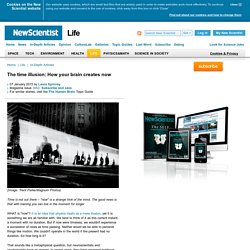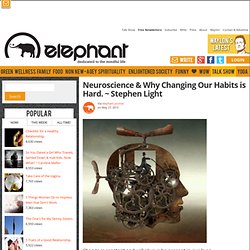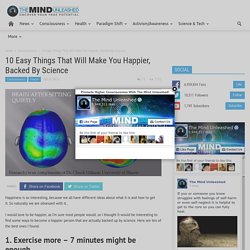

The time illusion: How your brain creates now - life - 07 January 2015. (Image: Trent Parke/Magnum Photos) Time is not out there – "now" is a strange trick of the mind.

The good news is that with training you can live in the moment for longer WHAT is "now"? It is an idea that physics treats as a mere illusion, yet it is something we are all familiar with. We tend to think of it as this current instant, a moment with no duration. That sounds like a metaphysical question, but neuroscientists and psychologists have an answer. Explaining Creativity. What the Synapses in Your Brain Actually Look Like.
Neuroscience & Why Changing Our Habits is Hard. ~ Stephen Light. Change is constant and will always be present in our lives.

In fact, the person you are when you start reading this article is different from the person you are after reading it—that is how quickly we change. Medical research has shown that in one year the physical makeup of your body changes 99% and only takes four years to become a completely new you. That means part of us changes every single moment. The big question is: Why is change so hard for us? I believe it has to do with our inability to manage the emotional component of change. The field of neuroscience reveals some interesting facts about how we deal with change in our bodies and the emotional impact it has on us. As you read, I encourage you to read it through the perspective of a behavior you have struggled to change: people pleasing, getting angry and shouting at people, putting yourself down, etc.
Our behaviors become addictions, and addictions are hard to change. To change these behaviors seems easy on the surface. Dr. 10 Easy Things That Will Make You Happier, Backed By Science. Happiness is so interesting, because we all have different ideas about what it is and how to get it.

So naturally we are obsessed with it.. I would love to be happier, as I’m sure most people would, so I thought it would be interesting to find some ways to become a happier person that are actually backed up by science. Here are ten of the best ones I found. 1. Exercise more – 7 minutes might be enough You might have seen some talk recently about the scientific 7 minute workout mentioned in The New York Times. Exercise has such a profound effect on our happiness and well-being that it’s actually been proven to be an effective strategy for overcoming depression. The groups were then tested six months later to assess their relapse rate.
You don’t have to be depressed to gain benefit from exercise, though. A study in the Journal of Health Psychology found that people who exercised felt better about their bodies, even when they saw no physical changes: 2. Why Physicists Are Saying Consciousness Is A State Of Matter, Like a Solid, A Liquid Or A Gas — The Physics arXiv Blog. There’s a quiet revolution underway in theoretical physics.

For as long as the discipline has existed, physicists have been reluctant to discuss consciousness, considering it a topic for quacks and charlatans. Indeed, the mere mention of the ‘c’ word could ruin careers. That’s finally beginning to change thanks to a fundamentally new way of thinking about consciousness that is spreading like wildfire through the theoretical physics community.
And while the problem of consciousness is far from being solved, it is finally being formulated mathematically as a set of problems that researchers can understand, explore and discuss. Today, Max Tegmark, a theoretical physicist at the Massachusetts Institute of Technology in Cambridge, sets out the fundamental problems that this new way of thinking raises.
Why Physicists Are Saying Consciousness Is A State Of Matter, Like a Solid, A Liquid Or A Gas — The Physics arXiv Blog. Scientific concepts that will make you smarter. This Cat May Have Just Saved Canada. You Won't Believe How. Last Friday, Guelph resident Andrew McPherson’s cat, Tutu, appears to have achieved the impossible.

Local residents claim their small town will never be the same again, and the future of Canada now seems certain. Ok, so this article has nothing to do with a mystical cat or the sleepy suburb an hour outside of Toronto, but if you’re reading this, your curiosity was piqued. And there’s good reason. Part of it is what is now dubbed the Upworthy-style headlines. Started in March 2012 by ex-employees of Move On and The Onion, the viral media site clocked an incredible 87 million unique visitors last month. While The Atlantic’s Robinson Meyer recently explained the analytics behind the massive surge in Upworthy’s traffic, what is really interesting is why the titles are so seductive. While such regular activities seem everyday, it is in this enormous neural pathway—from the midbrain to the Lateral hypothalamus into the medial frontal cortex—that dopamine is released.